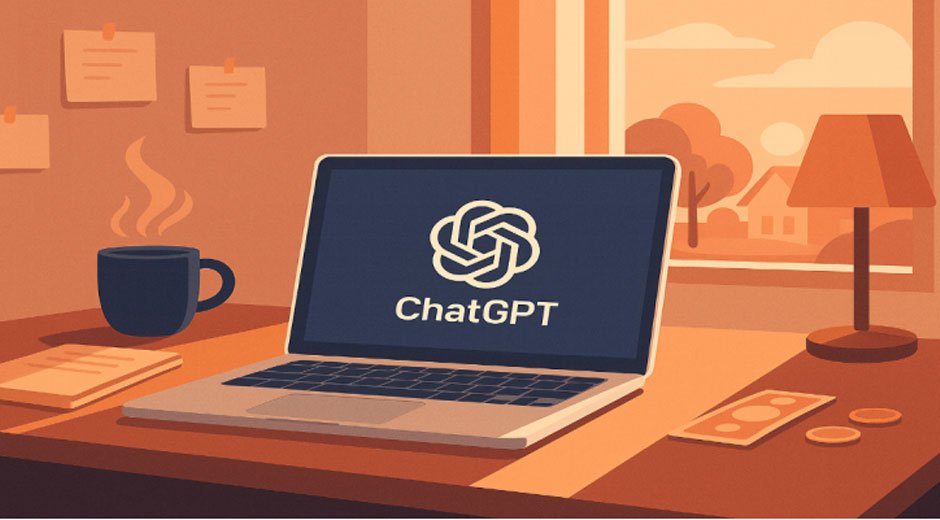Skip to the good bit
ToggleChatGPT wasn’t built as a calendar app, but for one remote developer it became exactly that. His mornings used to vanish into Slack threads, cloud dashboards, and inbox clutter. By the time he reached deep work, half the day was gone.
Then he tried a GPT-driven routine prompt. Instead of checking pings, his mornings turned into structured focus blocks. For the first time in years, coding happened before distractions.
The Remote Developer Who Started Each Day Backwards
He woke up at 7:30. Coffee in one hand, laptop in the other.
By 8:00, Slack was already open.
- 100+ unread messages.
- Project chatter mixing with memes.
- Bug tickets tagged as urgent by teammates across time zones.
Two hours later, he hadn’t written a single line of code.
The pattern repeated daily. He wasn’t lazy—he was reactive. Work started with noise, not with focus.
One morning he asked ChatGPT:
“Rewrite my morning routine so I do deep work before Slack.”
ChatGPT Flipped the Order of His Day
The answer wasn’t vague tips. It was a time-blocked plan:
- 7:30–8:00: coffee, quick journaling
- 8:00–10:30: deep coding block, no notifications
- 10:30–11:00: Slack digest and urgent responses
- 11:00–12:30: secondary tasks, bug fixes
- Afternoon: calls and async updates
It looked simple, but the rules mattered: Slack stayed closed until 10:30. Calendar alerts muted. Even his phone went on “Do Not Disturb.”
That morning, he shipped more code before lunch than he had all week.
How GPT Helped Him Stick to It
ChatGPT wasn’t just a one-time planner. Every night, he dropped in a line:
“Summarize tomorrow’s tasks and structure them into a 3-hour deep work block first, then everything else.”
The model built him a custom sprint every day.
If a feature launch was due, it pulled that forward. If clients were waiting on replies, it slotted them later.
After two weeks, his mornings looked unrecognizable:
- Focus hours completed daily before Slack opened
- Output up 40% compared to old routine
- No more nights catching up on missed tasks
Why Developers Started Quietly Switching
He wasn’t alone. Other remote workers in his circle admitted they’d also stopped using ChatGPT as just an “answer bot.” Instead, they used it as a workflow model.
Why?
- Trello boards stayed static, GPT adjusted in real time.
- Notion was too heavy; ChatGPT gave one clear list.
- Cloud reminders still pinged; GPT forced focus first.
The “alternative” wasn’t abandoning ChatGPT—it was using it differently.
Chatronix: The Workspace That Made It Stick
From juggling models to one cockpit
He still used Claude for client emails, Gemini for research summaries, and Perplexity AI to validate facts. The problem: too many tabs. Context kept breaking.
That’s when he moved his system into Explore Chatronix’s AI features.
Chatronix gave him:
- Six models in one chat: GPT-5, ChatGPT, Claude, Gemini, Grok, Perplexity AI
- 10 free queries to test new routines without cost
- Turbo mode with One Perfect Answer, merging all six outputs into one clean schedule
- Prompt stacks to save his “morning routine” template
- Side-by-side comparisons to pick the best plan instantly
| Workflow | Old Way | With Chatronix |
| Daily planning | Notion + sticky notes | One saved stack |
| Client emails | Manual rewrites | Claude polish |
| Research | Google + tabs | Gemini + Perplexity |
| Focus routine | Constantly broken | Turbo-generated guardrails |
Instead of chasing tools, he finally ran mornings like a pilot in a cockpit.
Bonus Prompt That Protected His Mornings
Here’s the exact line he still uses inside Chatronix Turbo:
“Restructure tomorrow’s morning for maximum focus. Block 3 hours for deep work, delay Slack until 10:30, include one 15-min break.”
The merged output was sharp, realistic, and repeatable. Every day started with clarity.
ChatGPT Prompting Cheat-Sheet (Beginner to Master)
Bookmark for this later… pic.twitter.com/JVDQ32jx8V
— Zumer (@zumercreator) July 19, 2025
The Bigger Shift Beyond Productivity
By the third week, his stats told the story:
- 15+ hours of deep work gained monthly
- 30% faster sprint completions
- Slack no longer dictated his mornings
- Evenings became guilt-free downtime
But the invisible shift mattered most: mornings felt light again. He logged in knowing what to do—not reacting to what others wanted.
Why This Story Matters
Remote workers often think flexibility means freedom. In practice, it often means distraction creep.
ChatGPT showed this developer that freedom came from structure, not chaos. And Chatronix turned that structure into a sustainable system.
The result wasn’t just more code shipped. It was mornings reclaimed.
Final Thought
He didn’t uninstall Slack. He didn’t stop being a team player.
He just stopped letting it own his mornings.
With ChatGPT and Chatronix, focus finally happened before pings.
And once mornings flipped, his entire workweek changed.
Because sometimes the smartest upgrade isn’t working longer. It’s starting right.







